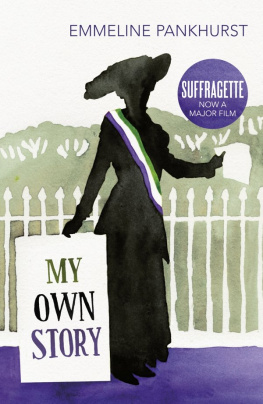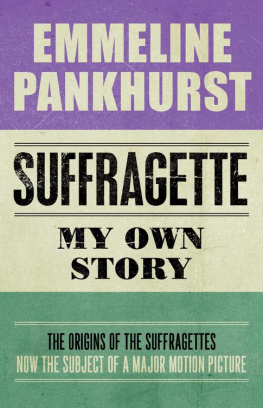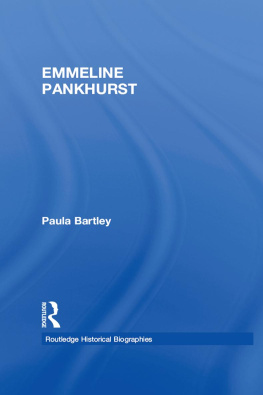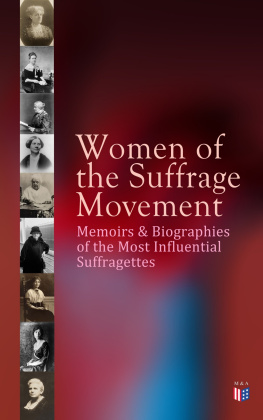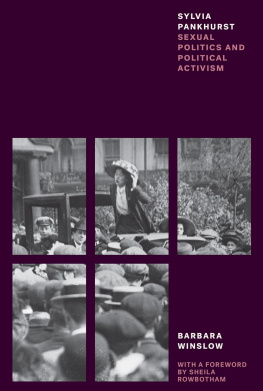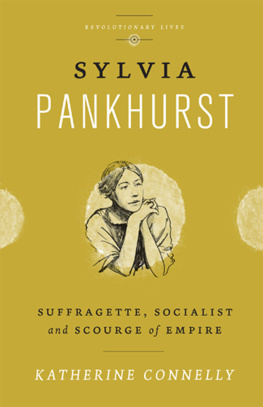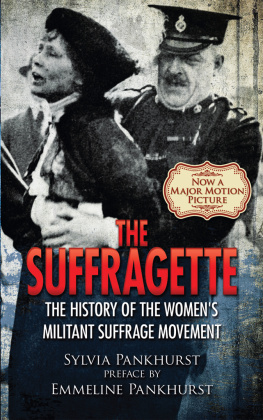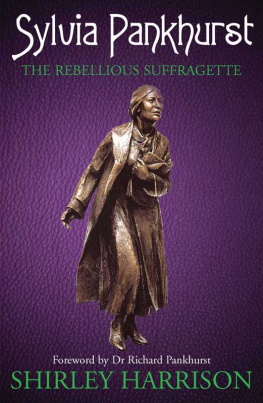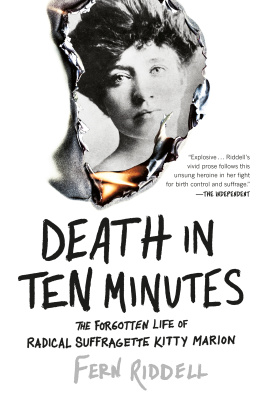Contents
About the Book
Emmeline Pankhurst grew up all too aware of the prevailing attitude of her day: that men were considered superior to women. When she was just fourteen she attended her first suffrage meeting, and returned home a confirmed suffragist. Throughout the course of her career she endured humiliation, prison, hunger strikes and the repeated frustration of her aims by men in power, but she rose to become a guiding light of the Suffragette movement. This is the story, in Pankhursts own words, of her struggle for equality.
See also: A Vindication of the Rights of Woman
About the Author
Emmeline Pankhurst was born in 1858 in Manchester, into a politically active family. She became interested in politics at a young age and a supporter of womens suffrage by the age of fourteen. As a teenager she attended school in Paris and on her return to Manchester she met and married Richard Pankhurst, a barrister twenty-four years her senior. Over the next ten years they had five children. Emmelines interest in politics and involvement in the suffrage movement continued to develop and she was a member of the Womens Franchise League and later the Independent Labour Party. In 1903, frustrated by the lack of progress on securing votes for women, Pankhurst and several colleagues founded the Womens Social and Political Union (WSPU), a militant organisation devoted to securing votes for women by direct action. For the following twenty years, members of the WSPU, led by Pankhurst, endured prison and hunger strikes in their struggle to win the right to vote. Their activities were called to a halt by the start of the First World War but in 1918, the government gave voting rights to women over thirty. Emmeline died on 14 June 1928, shortly after women were granted equal voting rights with men.
EMMELINE PANKHURST
My Own Story

Foreword
The closing paragraphs of this book were written in the late summer of 1914, when the armies of every great power in Europe were being mobilised for savage, unsparing, barbarous warfareagainst one another, against small and unaggressive nations, against helpless women and children, against civilisation itself. How mild, by comparison with the despatches in the daily newspapers, will seem this chronicle of womens militant struggle against political and social injustice in one small corner of Europe. Yet let it stand as it was written, with peaceso-called, and civilisation, and orderly government as the background for heroism such as the world has seldom witnessed. The militancy of men, through all the centuries, has drenched the world with blood, and for these deeds of horror and destruction men have been rewarded with monuments, with great songs and epics. The militancy of women has harmed no human life save the lives of those who fought the battle of righteousness. Time alone will reveal what reward will be allotted to the women.
This we know, that in the black hour that has just struck in Europe, the men are turning to their women and calling on them to take up the work of keeping civilisation alive. Through all the harvest fields, in orchards and vineyards, women are garnering food for the men who fight, as well as for the children left fatherless by war. In the cities the women are keeping open the shops, they are driving trucks and trams, and are altogether attending to a multitude of business.
When the remnants of the armies return, when the commerce of Europe is resumed by men, will they forget the part the women so nobly played? Will they forget in England how women in all ranks of life put aside their own interests and organised, not only to nurse the wounded, care for the destitute, comfort the sick and lonely, but actually to maintain the existence of the nation? Thus far, it must be admitted, there are few indications that the English Government are mindful of the unselfish devotion manifested by the women. Thus far all Government schemes for overcoming unemployment have been directed towards the unemployment of men. The work of women, making garments, etc., has in some cases been taken away.
At the first alarm of war the militants proclaimed a truce, which was answered half-heartedly by the announcement that the Government would release all suffrage prisoners who would give an undertaking not to commit further crimes or outrages. Since the truce had already been proclaimed, no suffrage prisoner deigned to reply to the Home Secretarys provision. A few days later, no doubt influenced by representations made to the Government by men and women of every political faithmany of them never having been supporters of revolutionary tacticsMr McKenna announced in the House of Commons that it was the intention of the Government, within a few days, to release unconditionally, all suffrage prisoners. So ends, for the present, the war of women against men. As of old, the women become the nurturing mothers of men, their sisters and uncomplaining helpmates. The future lies far ahead, but let this preface and this volume close with the assurance that the struggle for the full enfranchisement of women has not been abandoned; it has simply, for the moment, been placed in abeyance. When the clash of arms ceases, when normal, peaceful, rational society resumes its functions, the demand will again be made. If it is not quickly granted, then once more the women will take up the arms they today generously lay down. There can be no real peace in the world until woman, the mother half of the human family, is given liberty in the councils of the world.
BOOK ONE
THE MAKING OF A MILITANT
1
Those men and women are fortunate who are born at a time when a great struggle for human freedom is in progress. It is an added good fortune to have parents who take a personal part in the great movements of their time. I am glad and thankful that this was my case.
One of my earliest recollections is of a great bazaar which was held in my native city of Manchester, the object of the bazaar being to raise money to relieve the poverty of the newly emancipated negro slaves in the United States. My mother took an active part in this effort, and I, as a small child, was entrusted with a lucky bag by means of which I helped to collect money.
Young as I wasI could not have been older than five yearsI knew perfectly well the meaning of the words slavery and emancipation. From infancy I had been accustomed to hear pro and con discussions of slavery and the American Civil War. Although the British government finally decided not to recognise the Confederacy, public opinion in England was sharply divided on the questions both of slavery and of secession. Broadly speaking, the propertied classes were pro-slavery, but there were many exceptions to the rule. Most of those who formed the circle of our family friends were opposed to slavery, and my father, Robert Goulden, was always a most ardent abolitionist. He was prominent enough in the movement to be appointed on a committee to meet and welcome Henry Ward Beecher when he arrived in England for a lecture tour. Mrs Harriet Beecher Stowes novel, Uncle Toms Cabin, was so great a favourite with my mother that she used it continually as a source of bedtime stories for our fascinated ears. Those stories, told almost fifty years ago, are as fresh in my mind today as events detailed in the mornings papers. Indeed they are more vivid, because they made a much deeper impression on my consciousness. I can still definitely recall the thrill I experienced every time my mother related the tale of Elizas race for freedom over the broken ice of the Ohio River, the agonizing pursuit, and the final rescue at the hands of the determined old Quaker. Another thrilling tale was the story of a negro boys flight from the plantation of his cruel master. The boy had never seen a railroad train, and when, staggering along the unfamiliar railroad track, he heard the roar of an approaching train, the clattering car-wheels seemed to his strained imagination to be repeating over and over again the awful words, Catch a niggercatch a niggercatch a nigger This was a terrible story, and throughout my childhood, whenever I rode in a train, I thought of that poor runaway slave escaping from the pursuing monster.
Next page
